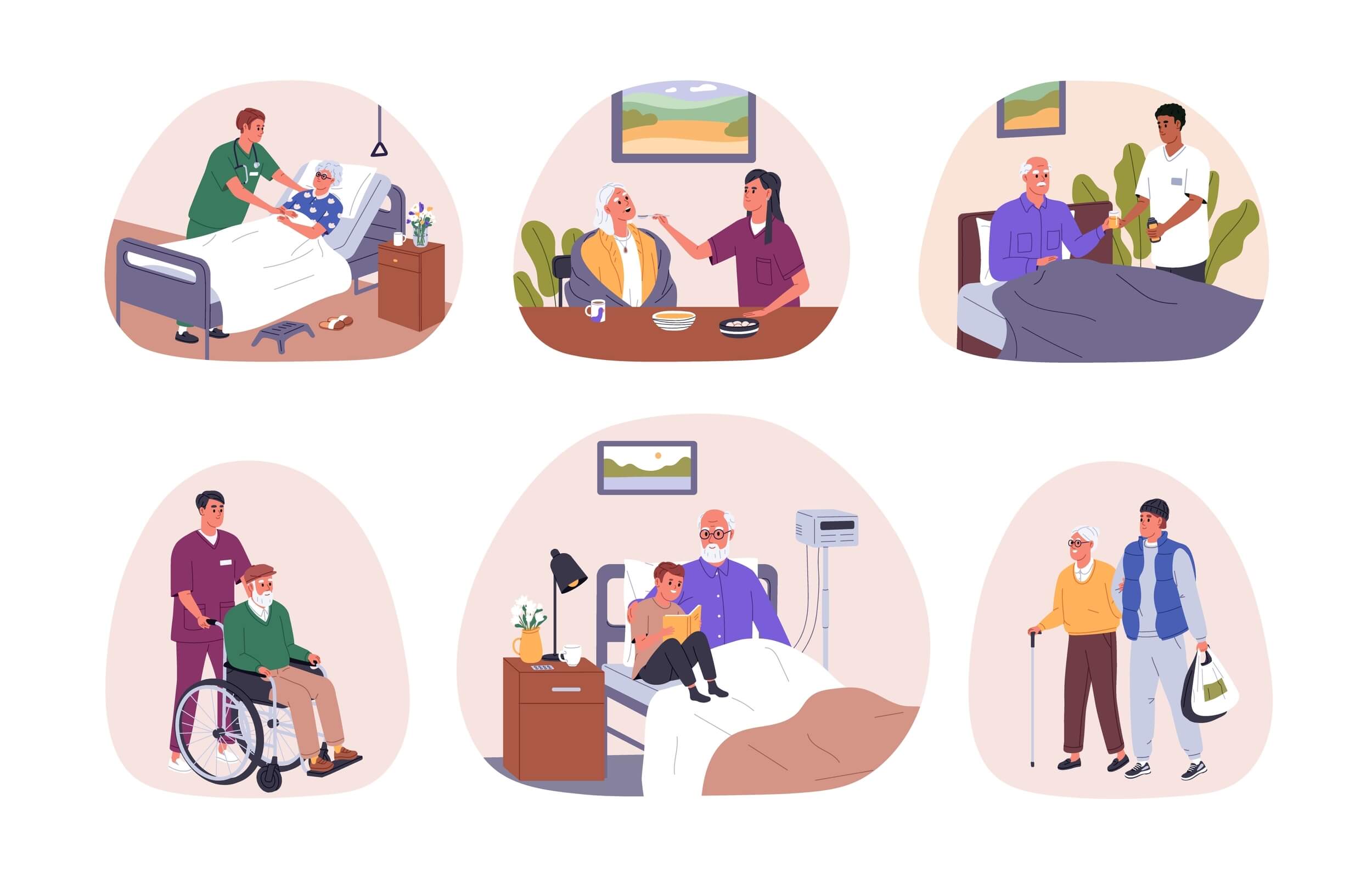
Page contents
- Why might I be discharged from a hospital to a care home?
- Who decides if I need to be discharged to a care home?
- Discharge to Assess (D2A)
- How will my care be planned?
- Can I choose which care home I’m discharged to?
- Will I be able to go home after a convalescent stay in a care home?
- How will I travel from hospital to a care home?
- Do I need to pay for a care home stay after a stay in hospital?
Page contents
- Why might I be discharged from a hospital to a care home?
- Who decides if I need to be discharged to a care home?
- Discharge to Assess (D2A)
- How will my care be planned?
- Can I choose which care home I’m discharged to?
- Will I be able to go home after a convalescent stay in a care home?
- How will I travel from hospital to a care home?
- Do I need to pay for a care home stay after a stay in hospital?
It is important not to stay in hospital longer than you need to. This is both to enable someone who needs the bed to have it and because it can be detrimental to your own health and independence.
You may experience loss of physical strength and balance, sleep deprivation and greater risk of catching infections from other patients or developing pressure sores if you stay in hospital for too long.
If you still need care and support while you recover from a stay in hospital, but no longer need hospital care, you may be discharged to a care home. This is called convalescence or respite care.
In some circumstances you may be discharged to a care home on a long-term basis, if you have been assessed as requiring residential care ongoing.
Why might I be discharged from a hospital to a care home?
You may be discharged from a hospital to a care home by choice, or because you have been assessed as needing to.
The default place to be discharged to should be your own home, unless you have chosen to go for a convalescent stay in a care home. There should be support put in place to enable you to do so. You may be temporarily discharged from hospital to a care home if you need aftercare and support that cannot be provided safely in your home.
Your short-term care needs could include:
- Support with day-to-day tasks while you recover from your illness or operation. You may have limited mobility while you heal, or need help with medication, preparing meals or washing and dressing.
- Nursing care which requires you to stay in a nursing home, or care home with nursing.
- Intensive rehabilitation.
You may have to move into a care home on a permanent basis if you are assessed as needing long-term residential care. Ideally an assessment for your long-term care needs should be done in your own home, as being in familiar and comfortable surroundings gives a much fairer picture of your health and how you are managing at home.
Who decides if I need to be discharged to a care home?
The decision about when you’re well enough to leave hospital lies with your consultant. When you are in hospital, you will usually have a group of doctors come round each day, led by the consultant. They will tell you if they are happy for you to leave and arrangements for your discharge can then be made.
Through assessments from other health and social care professionals, it may be decided that it is in your best interests to discharge you to a care home. This arrangement can only be made with your consent.
Other professionals who may be involved in your discharge include:
- Discharge coordinator – they manage your discharge and factors involved in it, such as informing your GP, organising where you are being discharged to, your transport (and money, keys, clothes etc) needed to get there and arranging follow ups to ensure that you have settled in well and that your aftercare is going as planned. They will be the main point of contact for matters involving your discharge.
- Acute discharge case managers – They usually only work with people who have highly complex cases and need very specialist support upon discharge.
- Rehabilitation support worker – They monitor how you are managing with day to day living after your discharge.
- Care home manager
- Nurse in charge
- Pharmacist
- Social worker
- Physiotherapist
- Occupational therapist
- Mental health practitioner
- Housing specialist
Discharge to Assess (D2A)
In England, Discharge to Assess is a means of ensuring that people get the care they need to recover from a stay in hospital without staying in hospital for any longer than they need to.
There are three different pathways you may be on, depending on the level of care and rehabilitation you need after your stay in hospital.
| Pathway 1 | Going from hospital to your own home. |
| Pathway 2 | Going from hospital to a short stay somewhere you can recover and rehabilitate, such as a care home. |
| Pathway 3 | Going from hospital to long-term residence in a place that offers the care and support you need, such as a care home. |
Find your ideal care home
- Explore a wide range of care options and facilities
- Read independent ratings and reviews
- Connect directly with care homes to book a tour and discuss your needs
How will my care be planned?
Before leaving hospital you will have a discharge plan created. This will assess your current needs and how they may change in the future. It will plan what support you need, by whom, any equipment that needs to be provided for you and when the plan needs to be reassessed. Your discharge plan should already exist before your consultant says you can leave hospital.
You should also have a separate care plan created for you to plan how your care will be delivered within the care home.
Care plans are person-centred. This means that rather than a one-size-fits-all approach, such as having a standard care plan according to a medical condition that you have, each plan is drawn up around your individual needs, preferences and situation.
Both plans should work together to ensure continuity of care as you move from hospital care to discharge to care home support.
Can I choose which care home I’m discharged to?
You should be able to pick which care home you go to after a stay in hospital. In some circumstances, one will be chosen for you from care homes in your area that are suitable.
When choosing for yourself, it will likely need to be a quick placement owing to you being in hospital. This means that you may be limited by which care homes currently have space, which can provide the type of care and support that you need and which are within your budget.
Even if you have been assessed as lacking the mental capacity to choose, the decision should be made with your own preferences and best interests in mind. If you have a Lasting Power of Attorney for Health and Welfare, they might be the one to make the final decision.
Whichever care home you go to, it must be able to meet your needs. For example, if you would like to go to the care home in the village you usually live in, but you have been assessed as needing nursing care which that home does not provide, you’ll have to choose another home.
In Scotland, you nominate up to three care homes in order of preference. Any care homes you nominate must have beds available.
Will I be able to go home after a convalescent stay in a care home?
Many people are able to return to their homes after a convalescent or respite stay in a care home.
Depending on your care and support needs and your housing situation, it is possible that you will be assessed as requiring residential care on a long-term basis. If this is the case, you may stay in the care home, or move to a different care home. Some people choose to become a permanent resident after finding the care, support and environment preferential to returning to their own home.
Health care professionals recognise the difference between your short-term needs and your long-term needs.
Decisions about your long-term care (such as whether you need to reside in a care home on a long-term basis) should only be made after the reason you went into hospital has been resolved (as far as is possible), whether that be recovering from surgery, a physical illness or a mental health reason.
How will I travel from hospital to a care home?
Your discharge coordinator will be responsible for making sure that you have safe transport when you leave hospital.
You may be able to use the free patient transport service (PTS), which is when the hospital provides transport for you to get from there to the care home.
Only certain people are eligible for non-emergency patient transport services (NEPTS). These are people whose condition means they will need extra medical support during their journey, people who find it hard to walk and parents or guardians of children who are getting the transport.
You will need to find out from the hospital if you are eligible for PTS.
You may need, or choose, to be taken by a friend or relative instead, or to go by taxi.
If you pay for your transport, you may be able to claim back the cost through the Healthcare Travel Costs Scheme (HTCS).
Do I need to pay for a care home stay after a stay in hospital?
If you are on a Discharge to Assess pathway (England), your stay in a care home will likely be funded for you. How long this funding will last varies.
In other cases, you may need to pay for your stay in a care home after a stay in hospital, unless you are eligible for state funding or for NHS Continuing Healthcare Funding.
You receive state funding for a care home stay if your capital and assets fall below a certain threshold. In this case your local authority will pay for some or all of your care. Find out more about paying for care.
NHS Continuing Healthcare Funding (NHS CHC) is when the NHS pays for your care. It is for people in England, Wales and Northern Ireland who are assessed as having a ‘primary health need’, which could be rapidly deteriorating health, a complex condition or a terminal illness. Find out more about NHS Continuing Healthcare Funding and how to apply.
If you are in Scotland, your personal and nursing care should be free. You will still need to pay for your accommodation.
Short-term stays can cost more than long-term residence fees.


